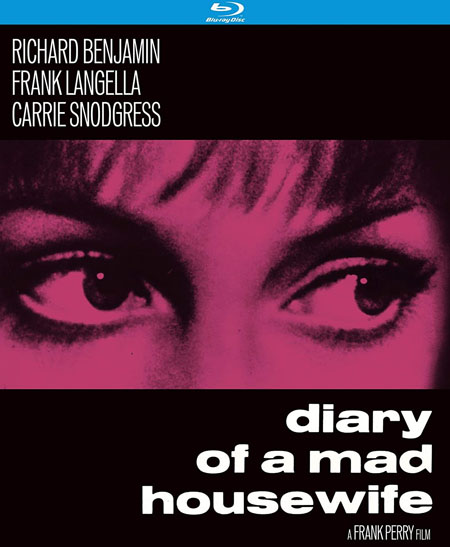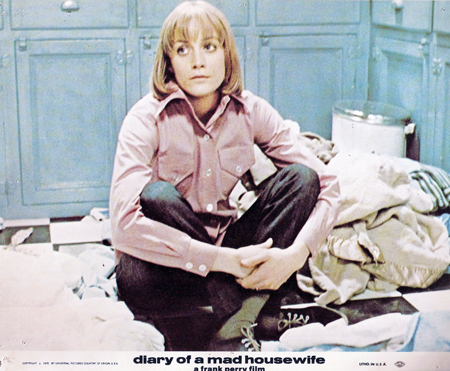
“NO,
SHE’S THE SANE ONEâ€
By
Raymond Benson
Frank
Perry was a notable director and screenwriter who in the early part of his
career made some acclaimed motion pictures—David and Lisa (1962), The
Swimmer (1968), Last Summer (1969), and this one, Diary of a Mad
Housewife (1970). Unfortunately, his later career was marked by problems
(he directed the much-maligned Mommie Dearest in 1981, for example). The
earlier films were written by or co-written with his then-wife and talented
scribe, Eleanor Perry.
Diary
is a
picture of its time and yet it can still resonate today with regards to the
#MeToo movement. The 1970 vibe is overpowering, for this was when Women’s Liberation
was on the rise and very much in the public consciousness. In this case,
Eleanor Perry is the sole writer, adapting the script from a 1967 novel by Sue
Kaufman. Starring newcomer Carrie Snodgress, who received an Academy Award
nomination for Best Actress and won a Golden Globe in the Best Actress—Comedy
or Musical category, the movie is decidedly a comment on New York City upper
class society at the time, as well as an acerbic meditation on male toxicity.
Tina
Balser (Snodgress) has everything going for her—a wealthy attorney husband,
Jonathan (Richard Benjamin), two young daughters, and a fabulous apartment in
Manhattan. She’s also smart, and she can be attractive when she’s not depressed
about what’s really going on in her life, namely that Jonathan is an A-1
Asshole. He is psychologically abusive, is a cad, he constantly belittles his
wife, he’s overly demanding, he expects sex because he’s “entitled†to it, and
he is ingratiatingly insufferable. Tina finally has enough and seeks out
fulfillment elsewhere. She meets a “famous novelist,†George (Frank Langella),
and begins an affair. Unfortunately, George is also an A-1 Asshole, is
psychologically abusive, is a cad, he constantly belittles Tina, and he’s
ingratiatingly insufferable. Through all this, the world and people around Tina
think she’s mad… but in reality, she’s the sane one in this story. Her
only fault is that she doesn’t get the hell out of Dodge, leave these
chauvinist, misogynist men behind, and start a new life somewhere.
All
three leads are excellent, although you’ll want to punch Richard Benjamin in
the face within two minutes of the movie’s beginning, and then keep punching
him every time he’s on screen. The same is true with overtly handsome, young
Frank Langella—I’m sure every heterosexual woman in the audience would sigh
over his presence but would soon also want to punch him every time he’s on
screen. Perhaps that’s why Tina goes for him (at first)—she needs some danger
and excitement in her otherwise mundane, submissive, and humiliating life with
her husband. Snodgress displays an elusive warmth in the picture that is
vitally important to its success. As a newbie, she received third billing after
Benjamin and Langella, but she carries the movie with courage, confidence, and
skill, and she appears in every scene.

Look
for Alice Cooper and his band performing in a party sequence, and you’ll also
spot Peter Boyle in an uncredited cameo at a therapy group session.
Kino
Lorber’s new Blu-ray showcases that easily recognizable 1970s film stock, and
it looks great. There are English subtitles for the hearing impaired, and the
movie comes with an audio commentary by screenwriter Larry Karaszewski, with
film historians Howard S. Berger and Steve Mitchell. Why Kino Lorber didn’t
hire a more appropriate female audio commentator is a mystery, but these guys
do a fine job anyway. The theatrical trailer for this and other Kino Lorber
titles are also included.
Diary
of a Mad Housewife is
certainly a relic of 1970, and yet it manages to still have something to say
fifty years later. In too many instances in the relationships between women and
men, very little has changed.
CLICK HERE TO ORDER FROM AMAZON